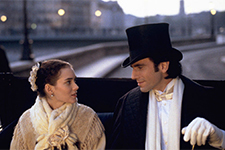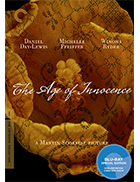The Age of Innocence
|  Martin Scorsese’s The Age of Innocence, which was based on Edith Wharton’s 1920 Pulitzer Prize-winning novel about illicit romantic desire thwarted by the rigid social strictures of the New York upper crust during the Gilded Age, came as something of a shock when it was released in 1993. After all, Scorsese was the American cinema’s great purveyor of organized crime, misguided vigilantism, and brutal violence; what was he doing making a “costume drama” of Edwardian manners? This sense of Scorsese being far outside his usual realm was reinforced by the fact that his previous two films, the kinetic gangster epic GoodFellas (1990) and the relentless psycho-thriller Cape Fear (1991), were among his most violent and bloody films. Of course, to see The Age of Innocence as being somehow outside of Scorsese’s purview requires one to willingly ignore the wide range of genres in which he had already worked at that point. Far from being a one-note chronicler of mean streets and bullets to the head, Scorsese had ably directed a woman’s drama (1974’s Alice Doesn’t Live Here Anymore), a classical-style musical (1977’s New York, New York), a concert documentary (1978’s The Last Waltz), two pitch-black comedies (1983’s The King of Comedy and 1985’s After Hours), and a controversial religious film (1988’s The Last Temptation of Christ). Looking over Scorsese’s filmography, in fact, one is struck by not just its breadth of genres and tones, but by the fact that the films people tended to associated with him (1973’s Mean Streets, 1976’s Taxi Driver, 1980’s Raging Bull), while all great, career-defining achievements, are actually in the minority of his work. Thus, The Age of Innocence—which is, to my mind, one of the greatest and most devastating films about the agonies of doomed love—was nothing less than a completely natural fit for a director who, despite being frequently caricatured and pigeonholed by his accomplishments in one cinematic arena, was actually an artistic chameleon, equally in love with all facets of movies and desirous of conquering all corners. And, if one had been paying close attention to Scorsese’s work up until that point, one would have seen that the themes and dramatic conflicts in The Age of Innocence, although bound up in the unique parameters of its story’s time and place, are quite common throughout his films. Scorsese had long been fascinated by the way human relationships are structured by customs and cultural codes, which is perhaps most obvious in his films about organized crime. Although they would seem, on the surface, to be worlds apart, the distance between power-hungry Mafiosos in the 20th century and wealthy socialites in the 19th isn’t as far as you might think. After all, they both prize above all else money, stature, and power, and they both live in constant fear of losing everything, which is why they must exert such heavy-handed control over their worlds. There is a sense of paranoia in The Age of Innocence, which it what makes all the beautifully adorned rooms, elegant gowns, and decorous dinners feel so claustrophobic and oppressive. As Wharton wrote in one of the many lines that get transcribed verbatim into the film, high society in 1870s New Work was a world “balanced so precariously that its harmony could be shattered by a whisper.” The protagonist in The Age of Innocence is Newland Archer (Daniel Day-Lewis), an attorney who comes from a prosperous, well-connected New York City family and has, therefore, never known a life outside of wealth and privilege. He is engaged to a young woman named May Welland (Winona Ryrder), who also hails from a powerful family, which means that their impending nuptials represent a merging of two formidable clans—all the better for consolidating power and wealth and keeping it among the fortunate few. The stability of the social class to which Newland and May belong is threatened by the return of May’s cousin Countess Ellen Olenska (Michelle Pfeiffer) from Europe, where she has left behind a husband who was apparently cruel and abusive. Nevertheless, as Newland puts it at one point, while the law favors divorce, social customs do not, which puts Ellen in the precarious position of being the constant outsider—always the subject of gossip, judgmental glances, and, in some quarters, outright scorn, but always under the guise of polite, genteel diplomacy. Nasty words are whispered behind closed doors, but out in the open, at all the fancy dinners, galas, and trips to the opera, it is all smiles and courtesy. Newland, who secretly desires to break free from the strictures of his class, but lacks the audacity to truly do anything more than gripe about it, is drawn to Ellen and she to him. The powerful mores under which they live forbids any kind of relationship, especially since Newland is betrothed to May, whose schoolgirlish innocence may be little more than a façade behind which lurks a deeper, more insidious understanding of how convention can be used to ensnare people in lives they may not want. Newland’s entrapment is a product of both his social class and his own unwillingness to truly subvert it; it is too engrained in his consciousness, a truth of which he is all too aware. Being on the outside, Ellen is even more cognizant of their harsh social reality, but she plays the game, too, often deferring to advice from others that goes against her potential freedom in favor of not rocking the boat. The screenplay, which was penned by Scorsese and his friend Newsweek film critic-turned-screenwriter Jay Cocks, is a finely tuned piece of work; each and every interaction between each and every character works on multiple levels, with the polite niceties of spoken words and gestures often acting in contrast to the characters’ deeper thoughts and feelings, some of which are revealed by the film’s elegant, soft-spoken female narrator (Joanne Woodward), who lets us into the characters’ minds and hearts—sometimes authoritatively and sometimes with supposition. It creates an overall sense of uncertainty that underscores the tension between the characters’ desires and the world in which those desires must operate, oftentimes by being repressed and abandoned. The Age of Innocence is one of Scorsese’s most passionate films, even though the extent of amorous physical contact is limited to a few kisses and, in one particularly memorable instance, the removal of a glove. Day-Lewis and Pfeiffer are both phenomenal in conveying the depths of their characters’ passion and despair—the intense longing for the other that they both know can never be consummated lest they risk literally everything in their lives. Newland grumbles at one point that he wishes to “find a world where words like [wife and mistress] don’t exist,” and when Ellen rigtly chastises him for desiring the impossible, it reminds us of both Newland’s own limitations and the very real dangers of social subversion. The ironically titled The Age of Innocence is no less a violent film than Taxi Driver, but rather than being physically damaged by bullets and knife blades, lives are instead devastated by cruel talk and the tyranny of custom.
Copyright © 2018 James Kendrick Thoughts? E-mail James Kendrick All images copyright © Columbia Pictures / The Criterion Collection | |||||||||||||||||||||||||||||||
Overall Rating: 


 (4)
(4)


